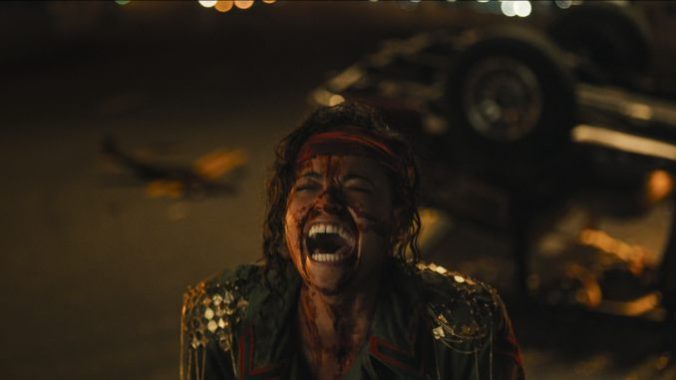Run Sweetheart Run Stumbles in its “Socially Conscious” Strut

At first it seems like Shana Feste’s latest film, Run Sweetheart Run, marks a drastic shift in the director’s established genre. Having directed multiple features in the romantic dramedy realm, Feste’s turn toward horror—particularly as it pertains to a date night drenched in crusted crimson (period) blood—feels almost like a jaded response to her previous filmography.
On the contrary, Run Sweetheart Run proclaims that a woman known for crafting stories predicated on compatible courtships can still have plenty to say about the dangers of the heterosexual dating scene. Based on a traumatizing experience the filmmaker once had while on a date in her native L.A., Run Sweetheart Run plainly represents the misogyny that runs amok in this country—going so far as to personify (and literally demonize) this pervasive societal ill that has plagued womankind for millennia. While the film contains some impressive scares, a phenomenal lead performance and steadfast central message, Run Sweetheart Run is far too preoccupied with speaking to a cultural reckoning that is truly only occurring in terms of optics and vernacular. Sure, it might seem that the media we’re consuming is more “feminist” and “socially conscious,” but in reality, the culture we’re living in continues to pledge fealty to what this writer’s former Women’s Studies professor casually labeled “white supremacist hetero-patriarchy.”
More broadly, Run Sweetheart Run asserts that a veritable tide is turning when it comes to gender equality in the U.S., so intense in its societal shift that an age-old entity must step in to preserve the status quo. This is how Cherie (Charlie’s Angels’ Ella Balinska), a young mother and aspiring lawyer, finds herself in a hellish game of hide-and-seek throughout the nocturnal cityscape of Los Angeles. After working a stressful shift as the assistant to successful lawyer James R. Fuller (Clark Gregg), Cherie gets a call from her boss, who’s clearly incensed. Though she has no recollection of double-booking his plans for the evening, he berates her for scheduling a business dinner on the same night as his anniversary. Just then, however, he gets an idea: What if Cherie took this young, attractive client off of his hands for the night? Eager to please her boss (and potentially work her way up the corporate ladder), she agrees without hesitation. After all, it’s been a while since she’s mingled with the opposite sex, especially in the wake of her separation from ex-boyfriend Trey (Dayo Okeniyi).
Cherie meets Ethan (Pilou Asbaek) at his lavish mansion in a well-manicured L.A. suburb. He quickly serves her a gin and tonic (allegedly the only cocktail he knows how to make), and the two engage in pleasant small talk peppered with glances of mutual attraction. Just before Cherie gets too comfortable, though, she notices an odd pearl of burgundy liquid on the hardwood floor. Dabbing it with her finger, she notices it’s blood. In fact, it’s her own—a thin trail oozes from her crotch toward her inner thigh, many women’s worst fear in a delicate social situation. She excuses herself to one of several bathrooms in the expansive abode, constructs a makeshift pad out of toilet paper, then reemerges and says she’s ready for dinner. After a night out consisting of designer sushi, roller-rink romancing and heart-thumping chemistry, the two ride back to Ethan’s estate. Though Cherie insists she should get home to relieve the babysitter, Ethan convinces her to cancel her Uber and stay awhile. Setting her inhibitions aside, she agrees—only to emerge from the house moments later visibly disheveled, badly injured and screaming for help. Predictably, the “good guy” has morphed into a groping ghoul, one that’s hell-bent on chasing Cherie through the slick city streets until he can finally have his way with her.
-

-

-

-

-

-

-

-

-

-

-

-

-

-

-

-

-

-

-

-

-

-

-

-

-

-

-

-

-

-

-

-

-

-

-

-

-

-

-

-








































